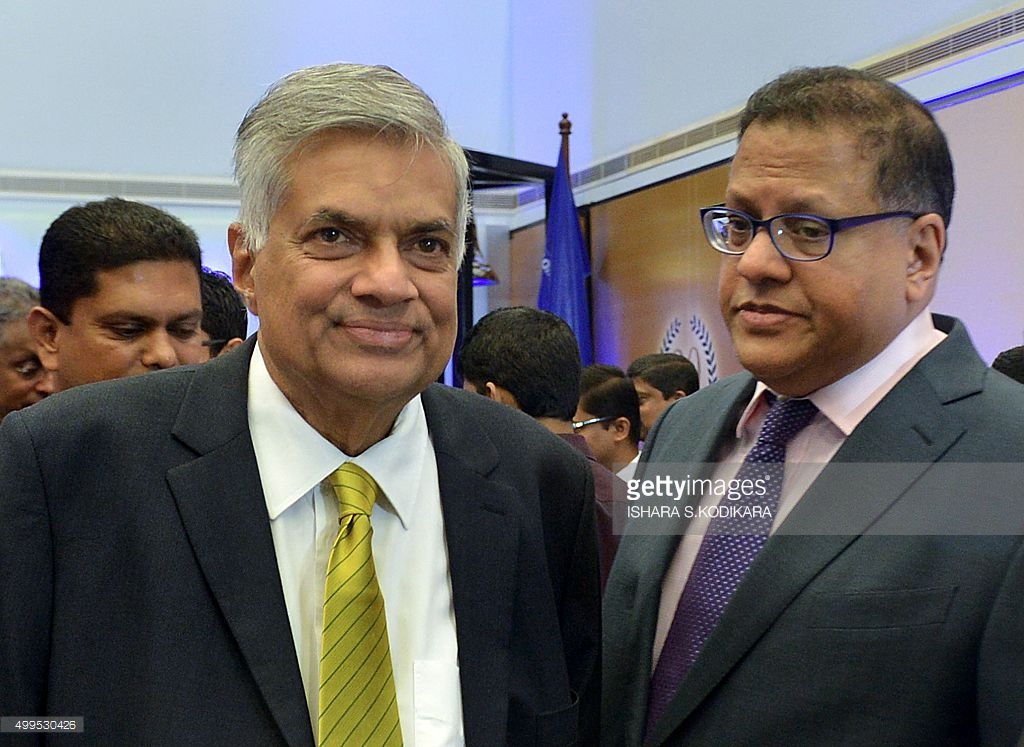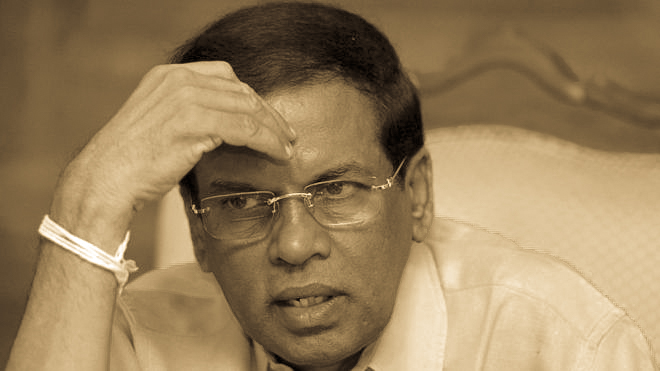by Rajan Philips.
Many things have happened after January 2015, and again after August 2015 –many good, more bad, and still more ugly. All were given the same pass because January 2015 was deemed a new beginning – the beginning of yahapalanaya. It has been a long beginning and we are now long last at the end of the beginning. Patience is wearing thin, not only outside the government but also inside it. Although, bear in mind, for diametrically different reasons. More than a week ago, the president bespoke to betray his impatience. Within a week the Director General of the Bribery Commission resigned, less ceremonially than when she was assigned. The Prime Minister keeps flying more literally like the Flying Dutchman than the figurative ghost ship. He has just returned from his latest travel, but will have no time for jet lag as there are quite a few fires to deal with in the government and in the country.
Jaffna was jolted back to its ‘old normal’ with the killing by police shooting of two university students riding a motorbike without stopping because they did not hear the order to stop. What is commendably not normal is the quick action by the IGP to arrest the policeman involved and to launch a CID investigation of the shooting. Colombo is now daily besieged by protests of one kind or another, or inundated by floodwaters. Regular fishermen in Puttalam have taken to street protests against unsustainable fishing practices by unscrupulous profiteers. Others living on the coast are getting restive over sand mining in their localities for Port City reclamation in Colombo. Regardless, the government seems determined to bulldoze Colombo into a megapolis of dreamy towers and dreary ground conditions. The government is seriously divided along party lines over what to do with Arjuna Mahendran for what he did at the Central Bank. Even more seriously, the government is divided down the middle, without party lines, over what to do with the Rajapaksas for what they did to the country after the war.

Arjuna Mahendran was parachuted in by prime ministerial aberration and has now become a political albatross. But the Rajapaksas are the primary reason for the yahaplanaya being. Perhaps the term yahapalanaya should no longer apply to this government except in jest. In any case, one (the SLFP) half of the national government was dead set against the yahapalanya movement in January 2015. The SLFP is now part of the government even after losing the August 2015 parliamentary election. No one can cavil at that because the UNP became ‘government’ even before winning the same August election. Not that many in the UNP did sincerely buy into yahapalanaya ideals and discipline. The old UNP bandicoots who did not do any heavy lifting against the Rajapaksas are now heavyweights in the cabinet. The youngsters who were inspired to carry the burden of opposition are now sidelined in government and reduced to being the defenders of the new status quo.
The yahapalanaya conundrum
There is no crisis, political or constitutional, as some commentators are opining. What is there is the yahapalanaya conundrum: Sirisena needs the UNP, but wants to lead the SLFP; Ranil needs Sirisena, but has no use for the SLFP; and both Sirisena and Ranil need to keep the military onside. Need and want are at the core of this conundrum. In economics, the two terms stand for different concepts. Need is necessary for survival, materially and spiritually (psychologically). Want is what we desire to have over and beyond the necessities of life. In the nineteenth century, the Young Marx described humans as “creatures of needs” and went on elaborate on the essence and the alienation of the human being. Two millennia before that, Prince Siddhartha elaborated on ‘want’ or desire as the source of all suffering and charted a path of renunciation for human salvation. In our time, wants are what that drive the scourge of consumerism. In reality, needs and wants tend to overlap. At least most people use and experience them interchangeably in life and in politics.
Maithripala Sirisena knows that he cannot survive politically without the UNP. He also knows that he cannot have any political weight without a prop that is outside the UNP. Becoming the leader of the SLFP would hardly have been on his agenda when he defected from the Rajapaksa government, but without leaving the SLFP, to become the common opposition candidate against his former president. Sirisena got his opportunity to lead the SLFP when Mahinda Rajapaksa chose to honour the tradition of peaceful transition in democratic politics unlike Donald Trump who is now bluffing to upend that tradition in the US. However, Rajapaksa has been having second thoughts about the SLFP leadership after voluntarily renouncing it, while Sirisena has not been able to take full control of the SLFP nearly two years after it was handed to him. People can understand Sirisena’s need for the UNP and his desire to lead the SLFP. What they may not appreciate is his turning out to be an imitation version of the Rajapaksas. People usually don’t like imitations, especially when they can repurchase the original if they want to.
Everyone knows that the yahaplanaya boat will not be stuck in mud as it is now, if the Prime Minister has done things differently in his choice of cabinet ministers and portfolios, did not whimsically yank institutions like the Central Bank from one ministry to another, and did not make cavalier appointments to key public positions. No doubt, the Prime Minister thinks well and means well but what Sri Lanka has needed after January 2015 is not well-intended idiosyncrasy replacing malignant autocracy but a system of governance based on institutionalized decision making that is transparent, responsive and accountable. What we have instead is personalized prime-ministerial decision making that is transparently unresponsive and indifferent to any and all concerns of others.
The President and the Prime Minister know they need each other but do not seem to have mastered the art of expanding their areas of agreement and prioritizing them over what they do not agree upon. Their peculiar partnership requires a great deal more of positive agreements than the diplomatic inertia of ‘agreeing to disagree.” They cannot progress in government by agreeing to disagree. Obviously, the Prime Minister is not used to sharing decision making with another person, while the President may seem hesitant to push back on the Prime Minister in their private encounters. He resorts to public outbursts and blames the media for not reporting him in full – because he delivers his messages in two parts: one blaming what is going on in the government without his knowledge, and two asserting that he will not do anything to bring down the government. That is his way of describing his conundrum.
It is rather baffling that even after nearly two years there is no common ground between the President and the Prime Minister on the central purpose for which they were elected to power by the people, namely, exposing government corruption under the Rajapaksas and scrupulously avoiding it in their new government. One would have thought that this topic would have been the topic of daily conversation between them and that they would have to come to some understanding of the seriousness of the challenge and practical ways of dealing with it. It is a cop out to say that the remnants of the Rajapaksa regime are thwarting investigations and the prosecution of past corrupt practices. The truth of the matter is that there has been no joint-message to-date from the President and the Prime Minister, publicly and otherwise, that they mean serious business on this matter. Worse, there is corruption going on in this government under their very noses. The President’s bother is that current SLFP ministers are being unfairly picked on for nothing, while UNP ministers are enjoying all the graft and gravy.
There are understandable, not necessarily justifiable, grounds for differences between the two men in other areas – national reconciliation, the new constitution, and the UNHRC resolution. They have to deal with contending forces internally and internationally. On these matters, the two leaders will have greater public understanding on their side if they can demonstrate their unity in fighting corruption, past and present. Without that demonstration they will only cultivate public cynicism and not public support. In addition, they can make their work on contentious matters easier if they work together to address local ground realities rather than wasting time in trying to develop international protocols on how to deal with war crimes. As it has been said many times before, the insistence on war crimes investigation will become less strident if the President and the Prime Minister can act to prevent new crimes against war affected people.
